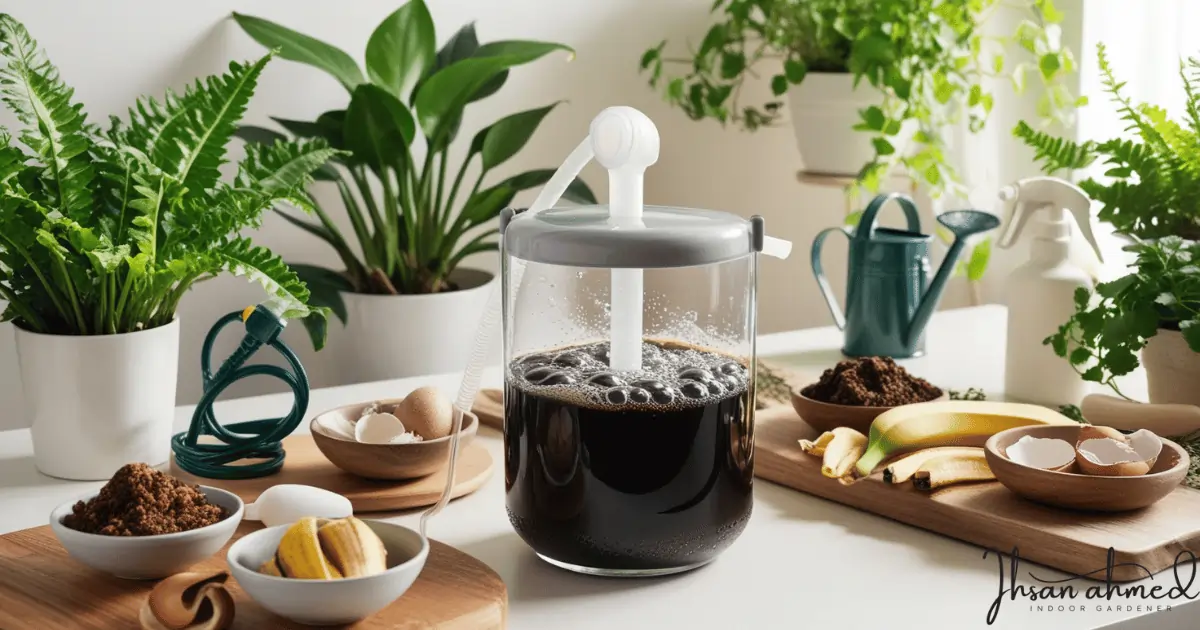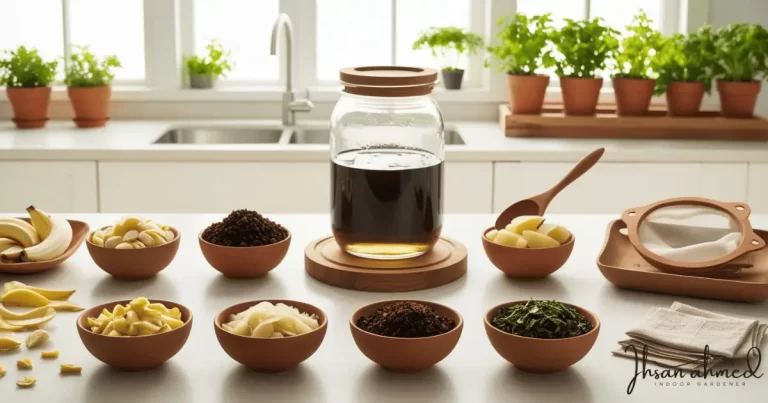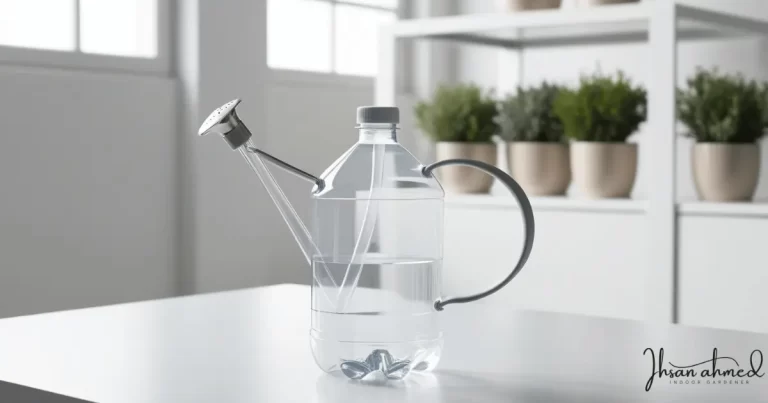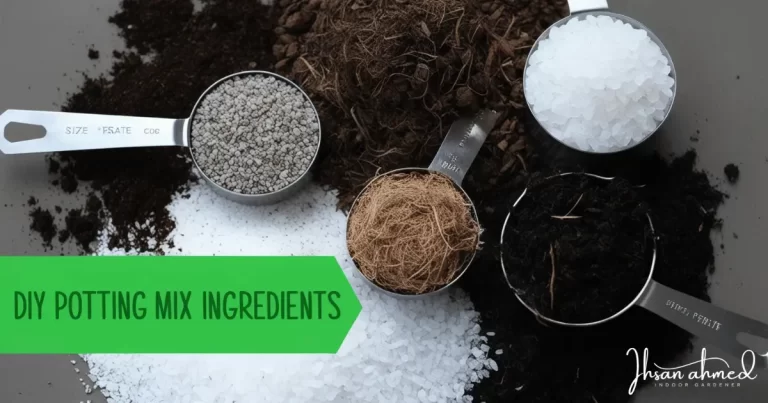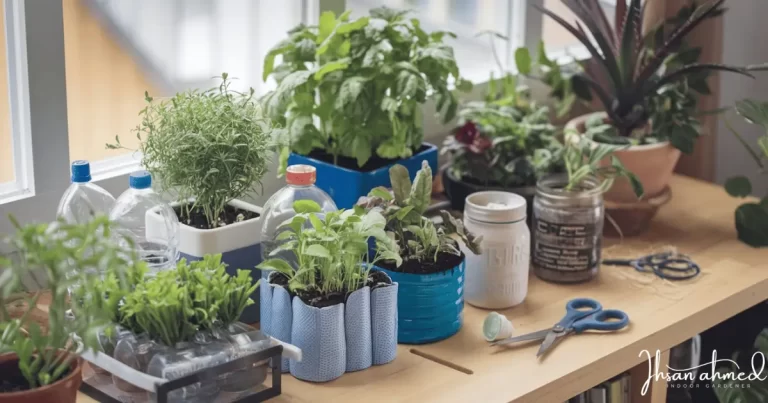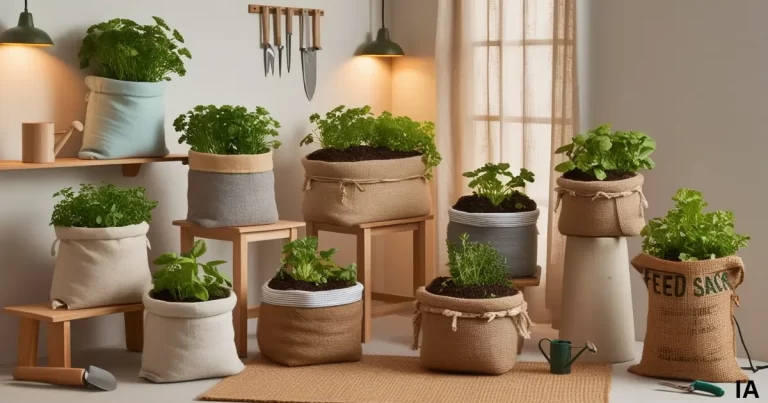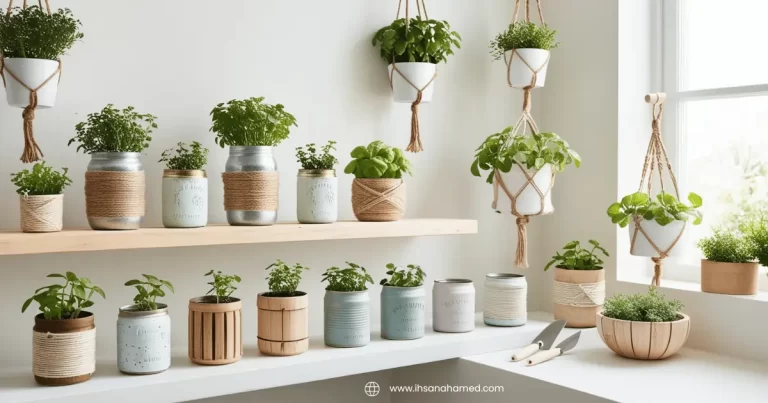1. What is Indoor Compost Tea? Compost tea is a liquid fertilizer that helps the unique plants to support and grow indoors. It is derived from stepping compost and contains beneficial microbes, enzymes, and organic compounds.
This tea acts as a natural boost for potted plants, improves soil health, and provides essential nutrients, which are often ignored in indoor gardening.
Why Compost tea is essential for indoor plants?
Indoor plants have limited natural resources like rain, worms, and natural decomposition but compost tea provides them with these microbes and nutrients directly. Compost tea acts as a soil system because potted plants have limited soil, we need to replace the soil frequently but it helps to keep soil in good condition. Chemical fertilizers are hazardous to plants as well as the environment but it is eco-friendly and can be used frequently without worrying. Indoor plants completely depend on indoor gardeners and the environment, so this tea helps to keep the plant’s eco-friendly ways to feed them. How Indoor Compost Tea Works for Indoor Plants
Direct Nutrient boosts like Nitrogen, phosphorus, and potassium. Beneficial bacteria and fungi restore the soil microbiome. Keep the pests and diseases away from indoor plants. 2. Types of indoor compost tea Types of indoor compost tea based on plant needs and indoor setups, we list a few of the compost tea commonly used indoor gardening.
Aerated Compost Tea (ACT) Vegetables and herbs often face the problems of limited soil nutrients, compact containers, and a controlled environment. Aerated Compost Tea (ACT) helps to grow plants healthy and maximize the yield during harvest.
How to use Aerated Compost Tea (ACT)
Prepare the compost tea and make it idle for 2 days before applying Dilute indoor compost tea in a ratio of 1 part compost tea and 10 parts dechlorinated water for seedlings and young plants, and 5 parts for mature plants. The first method is to apply directly around vegetables and herbs. The second method is to spray them through leaves Don’t overfeed them, use it once in 2-3 weeks Non-Aerated Compost Tea (NACT) Non-Aerated Compost Tea (NACT) is an easy method to make without any equipment, such as soaking compost in water without an air pump. It has fewer beneficial microbes compared to Aerated Compost Tea but it delivers essential nutrients and microbes that can boost indoor plants.
How to use Non-Aerated Compost Tea (NACT)
Prepare Non-Aerated Compost Tea and mix the water in a ratio of 1:1 Pour the tea directly into the soil base and root zone, and avoid soaking from waterlogging. You can mist the leaves too with a spray bottle 2-3 weeks are recommended for leafy vegetables and herbs, and 1-2 weeks for herbs like basil, parsley, and cilantro. You can do it every week for tomatoes and peppers, especially in the early stages. Verm compost Tea Verm indoor compost tea is a liquid fertilizer made from worm castings, loaded with essential nutrients and microbes to grow plants stronger and healthier. To boos this tea unsulfured molasses is added in addition to this.
How to use Verm compost Tea
Prepare vermicomposting tea and wait for 24 hours to well mix. Dilute in water in a ratio of 1:1 Apply directly into the soil every 3 weeks for steady and faster growth. Trying alternative methods for spraying through leaves every 2 weeks. Bokashi compost Tea Bokashi tea is a nutritious liquid produced from Bokashi composting, however, this tea is highly acidic and concentrated, so it should be diluted before applying it to indoor plants.
How to use Bokashi Tea
Proper dilution is mandatory before applying to indoor plants, due to acidity, it may harm the plants. Mix in a ratio of 1:100, as in general 1 tablespoon for every gallon of water and half spoon for seedlings and sensitive plants. Pour the tea around the base of the plants, focusing on the root zone every 3 weeks, and spray them every 4 weeks Better to test the pH level of the soil before adding the tea, if the soil becomes acidic add lime to it to neutralize it. Microbe-Enhanced Compost Tea It is made from brewing compost with specific additives to boost essential nutrients and beneficial microbes. Often unsulfured molasses, kelp extract, and fish emulsions are added based on plant needs, this tea is more useful for plants with extra care.
How to use Microbe-Enhanced Compost Tea
After the indoor compost tea is prepared, wait for 2 days to well mix and dilute in water in a ratio of 1:10 Apply directly into the soil and avoid waterlogging Spray to the leaves of the plants alternatively. The frequency is 2-3 weeks for deficiency plants and 1-2 weeks for natural boost. Kitchen Scrap Compost Tea Kitchen scrap compost tea is a liquid fertilizer that is made on vegetables and fruit scrap which is soaked in water. It gives direct nutrients to plants, budget budget-friendly, and easiest way to recycle food waste.
How to use Kitchen Scrap Compost Tea
Once the kitchen scrap tea is prepared, you need to wait for one day so that all the essentials are mixed in the proper way to use. Dilute the tea in a ratio of 1:1 Feed them every 2 weeks during growing periods You can apply directly into the soil or spray them on leaves. Fungal-Dominant Compost Tea Fungal-dominant compost Tea is a special liquid fertilizer made from brewing compost, it helps to break tough organic soil to improve the soil structure, and its ingredients are wood, leaf mold, and aged compost.
How to use Fungal-Dominant Compost Tea
You need to chop the ingredients to make a compost tea and wait for 2 days once the process is finished. Dilute the tea in a ratio with water 1:10 every 3-4 weeks for long-term growth. Apply the tea directly into the soil and focus on the root zone Alternatively, mist the leaves of the plants Manure-Based Compost Tea Manure-based indoor compost tea is a liquid fertilizer made from well-aged compost from cow, chicken, or horse manure. It provides essential nutrients like nitrogen, phosphorus, and potassium that help to grow the plants strong and healthy. It must be diluted into the water before applying to the plants.
How to use Manure-Based Compost Tea
Make manure-based compost tea and wait for 2 days to release nutrients into water. It must be diluted into water in a ratio of 1:10 and avoid over-fertilizing. Apply 2-3 weeks for leafy greens and herbs when using direct application. When applied through misting on leaves apply every 3-4 weeks for edible plants. 3. How to Make Indoor Compost Tea at Home Making compost tea at home is a very easy and simple way to do with basic equipment and few ingredients but they are rich in nutrients and microbes.
Below are the essentials to make indoor compost tea at home
Ingredients for Compost Tea Step-by-Step Instructions Tips for Success Ingredients for compost tea
Compost 1 cup options like kitchen wastes, worm castings, leaf molds, or aged compost Water – 1 gallon, dechlorinated water only to be used, chlorine water may kill the microbes. unsulfured molasses (1 Tablespoon) Kelp extract (1 Tablespoon) Fish emulsion (1 Tablespoon) Bokashi liquid (Optional) Large container or bucket Air pump Stirring stick or spoon Strainer Mesh bag Step-by-Step Instructions
Fill the container with 1 gallon of dechlorinated water Add 1 cup of compost in water or a mesh bag. If you are using mesh bags seal them properly, this can help to keep the tea clean when straining. Add additives like molasses, kelp extract, fish emulsion, and Bokashi liquid. Add these additives with precaution as they may harm the plants, especially bokashi liquid. Know the ideal ratio of each additive before adding it to indoor compost tea. If you have an air pump, you can produce Aerated Compost Tea (ACT), place the hose in the container, and use the air pump to bubble it for 2 days. If you do not have an air pump mix faster than normal 2-3 times to introduce oxygen. Allow 2 days for nutrients and microbes can infuse into the water. Use the strainer to remove the solids and can be used in compost for further processing. Tips for Success
Compost tea should be used within 1 or 2 days that are more effective. Check the plants regularly the symptoms like yellow leaves for overfertilization then adjust the dilution based on plant needs Avoid using chlorine water as it may harm the plants, it is mandatory to use dechlorinated water Leftover compost should be back to compost to make mulch. 4. How to Choosing the Right indoor Compost Tea for your plants
Choosing the right indoor compost tea based on plant needs, growth stages, and challenges. Each one of the compost is used for specific types and know the plant needs and choose them.
Aerated Compost Tea (ACT)
Best for general plants can boost soil microbes Use against to improve soil health and overall plant growth Prevent root root and promote stronger root systems Most indoor herbs and leafy greens such as basil, parsley, spinach, and lettuce. Non-Aerated Compost Tea (NACT)
Best for quick and low-maintenance plants Can be prepared without any special equipment and can be done at home. Without any complex preparation Best for beginners who want to grow herbs and vegetables Vermicomposting Tea
Best for regular and sensitive plants. Used against delicate plants and mild fertilizers. Ideal for small spaces indoors Beneficial plants are mint, cilantro, and delicate greens. Bokashi compost Tea
Best for acidity-loving plants Used for sustainable fertilizer High in nutrients need heavy dilution to avoid harmful The best example is tomatoes Manure-Based Compost Tea
Best for targeted plants and improves soil health Can be used against specific nutrient deficiencies Customizable with molasses and fish emulsion. Best for nutrient-deficient plants, peppers, and tomatoes. Kitchen Scrap Compost Tea
Budget-friendly and quick nutrient boost. To recycle kitchen wastes Sustainable and easy to make but with fewer microbes Fast-growing herbs and leafy greens Fungal-Dominant Compost Tea
Improve soil structure and long-term plant health Supports stronger rooting system Focus on fungi and helps to build healthy soil Best for carrots, radishes, thyme and woody herbs Microbe-Enhanced Compost Tea
Best for heavy feeding and nutrient plants Helps the plants to support stronger nutrients High in nitrogen, phosphorus, and potassium to be diluted carefully Best for fruity vegetables and herbs 5. Common Mistakes to Avoid When Using Indoor Compost Tea Compost tea is a powerful and natural fertilizer that can boost the health of indoor plants but mistakes in preparation may cause damage to indoor plants and avoid the following mistakes while making a compost tea.
Don’t use fresh and not composed materials it may harm the plants due to introducing harmful pathogens and burn the plant roots because of high nitrogen levels. Always use only composed and scrap materials instead of fresh. Applying compost tea directly without any dilution or improper dilution, especially in strong teas such as manure-based and bokashi tea. It may harm the plant roots, and leaves and burn the nutrients. Always dilute in the proper ideal ratio for direct compost as well as the foliar spray method. Using tap water directly from the faucet, which contains chlorine may kill the beneficial microbes that have no use and are less effective. Use only nonchlorine water rain water or filtered water 24 hours after the composed is processed. Brewing the compost for less and longer periods, short brewing has fewer microbial, and longer brewing can inject harmful bacteria, foul odors, and lack of oxygen. Brewing between 24 to 24 hours is an idea for aerated compost tea (ACT) and find the ideal ratio for each and every tea when making. Adding compost in wet soil or waterlogging soil can suffocate plants and root rot. Check the pH level of the soil before adding these teas. This compost tea should be used within 48 hours then it may lose its microbes as well as it can release anaerobic to harm the plants. Check the pH level before using the compost tea, especially Bokashi tea which is acidic, use lime or baking soda to neutralize. Even though sunlight doesn’t affect indoors, climate and environment can affect the room temperature, so don’t use it in high sunlight. Better to use in the early morning or late evening is a perfect time to add compost tea. You may think frequent feeding can grow faster but it harms the plant’s health and nutrient imbalances. Stick to the correct schedule of 2-3 weeks is enough for the plants to grow herbs and vegetables. Don’t try to apply the compost to all plants without testing in small areas or single plants before applying it to entire plants it can destroy your indoor gardening. Neglecting cleanliness while making compost, especially using tools that can introduce harmful bacteria, clean the tools properly before starting a brewing process. Conclusion
Indoor compost tea is the easiest and most organic way to boost your plants with enough nutrients and beneficial microbes. Apply these fertilizers regularly to see the best results and grow your plants stronger in the long run. Making this tea is often routine work of even indoor gardeners to keep the indoor plants healthy and alive.
Are you want to elevate your indoor game to the next level then why don’t you check out our other blog posts on essential indoor gardening supplies to start your indoor garden and how to find the problems while growing herbs and vegetables in a container especially from yellow leaves and stunted growth from under watering and over watering.
How to increase the yield on container gardening during harvest and how to make your own DIY potting mix in an easy and cheapest way .
Most Frequently Asked Questions
What is Indoor Compost Tea, and why is it essential for indoor plants?
Indoor compost tea is a liquid fertilizer made by steeping compost in water, extracting nutrients and beneficial microbes. It provides essential nutrients like nitrogen, phosphorus, and potassium while promoting soil health and boosting plant growth
What are the different types of indoor compost tea?
There are several types of compost teas based on plant needs, few of them are listed below:
What ingredients you need to make compost tea?
Compost
How often indoor compost tea should be applied?
ACT and Verm compost Tea: Every 2-3 weeks.
What are common mistakes to avoid?
Fresh materials without proper decomposition
